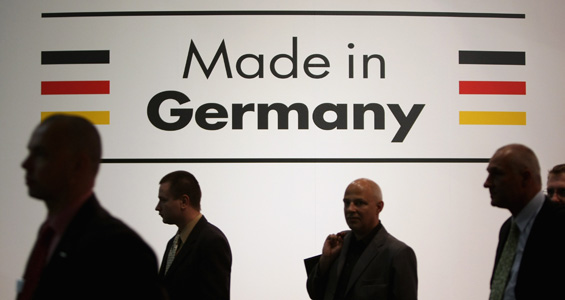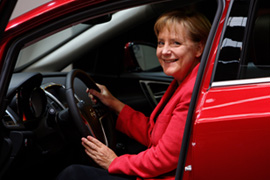Germans ‘face post-election shock’
Samah El-Shahat says the ruling political elite have concealed the state of the German economy.

 |
| Angela Merkel, the incumbent German chancellor, has recommended exporting German-style capitalism to the rest of the world [GALLO/GETTY] |
Samah El-Shahat, Al Jazeera’s resident economist, writes a regular column analysing key events that contributed to the global financial downturn and its impact across the world.
| Germans face rude economic awakening |
| in depth | |||||||||||
|
Have you heard the joke about the German who woke up one day after his country’s September 27 general election to find out that things are not at all as they seemed to be the night before, that things are actually so bad that he could be forgiven for thinking that he is still in bed experiencing a cruel nightmare? And I shall resist from making any Kafka references here.
But this is no nightmare – it is reality. Okay, I grant you, it is no joke either.
So, what could have possibly happened in 24 hours, you may ask. And before you attempt to work it out, let me give you a hint: It has nothing to do with who wins the election but has everything to do with the state of the German economy.
Duped
The ruling political elite have duped Germans about the state of their economy.
In fact, the German government has gone out of its way to keep secret just how bad things are. But the truth will have to come out once the elections are over and the economic cat will be let out of the proverbial bag.
Many Germans can be forgiven for thinking that they have weathered the economic crisis better than most and, more crucially, better than their rivals such as the US and, in particular, the UK, who used to sneer at continental stagnation.
In many ways they are right. Early fears of job losses did not materialise in large part thanks to short-time work schemes set up by the German government.
 |
| Merkel has propagated a ‘false sense of economic wellbeing’ [GALLO/GETTY] |
A car-scrapping scheme – much copied elsewhere – kept vehicle sales afloat and thrilled car-mad German voters.
This false sense of economic wellbeing has been further propagated by both Angela Merkel, the German chancellor, and Peer Steinbrueck, the finance minister, who have been going out of their way to tell the world that Germany’s market socialist model – based on a link between government, industry and banks – has trumped the Anglo-American model that underpins the US and UK economies.
Steinbrueck on many occasions laid the blame for the whole financial crisis squarely on the US and what he called an Anglo-Saxon drive for double-digit profits and massive bonuses for bankers and company executives. This led the German people to believe that it was “ungerman greed” that caused the crisis.
So confident is Merkel of the superiority of Germany’s home-grown brand of capitalism that in one election speech she suggested exporting it to the rest of the world. So now, besides our BMWs and Miele kitchen appliances, we may have also have a new economic model coming from Bavaria.
Hard economic choices
All good and well I hear you say. So where is this much touted nightmare?
Well it comes in the form of the one trillion dollars of toxic assets on the balance sheets of German banks that the German government has been going out of its way to keep under wraps from its own people and the rest of the world.
In fact, some could argue that the state of Germany’s ailing banks is such a state secret that, despite a number of attempts, even the International Monetary Fund (IMF) and European Union (EU) could not penetrate it.
 |
| The government has concealed the state of Germany’s ailing banks [EPA] |
The IMF has repeatedly called on the country to carry out stress tests, like those undertaken in the UK and the US, to establish how bad their condition is and how much more capital they will need to make them healthy again. But this has been out rightly rejected by the German government.
Knowing that taxpayer’s money would be needed to possibly prop up their ailing banks – a decision that would prove very unpopular with the electorate – the German government decided to postpone making hard economic choices out of fear of losing votes.
So instead, the government is allowing banks to conceal or defer the full extent of their losses on toxic securities and bad loans and refusing to subject them to public stress tests or to require them to increase their capital. In doing so it risks perpetuating “zombie banks” that are too sick to lend to businesses and households.
“There are very strong political reasons for the policy paralysis,” said Nicolas Véron of Bruegel, an economic research group in Brussels. “Nothing can happen before the German election.”
Endangering Europe
But in waiting, Germany is putting in danger not only its own economy but the rest of Europes as well.
The real fear now is that Germany could slide back into a deep and nasty recession. After all no real recovery can be sustainable without a healthy banking sector, particularly in an economy that is so export oriented.
Germany has many different sized manufacturing firms that will need to borrow from banks to benefit from the upswing in demand caused by the end of the recession. And if Europe’s biggest economy goes sick, whilst other economies are getting better, it could end up stymieing the growth of other economies as they emerge out of recession.
I wonder whether this is the market socialist model that Merkel wants to export to the rest of the world – one of political expediency and ambition over political responsibility. How Ungerman is that!
Samah El-Shahat also presents Al Jazeera’s People & Power programme.
The views expressed in the above column are the author’s own and do not necessarily reflect Al Jazeera’s editorial policy.
